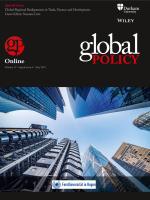Algorithmic bias and the (false) promise of numbers
The field of global health is notoriously entangled with the complexities and politics of information and technology, from monitoring and reporting systems overloading professionals to data-collection that may pose risks to the privacy of patients, to various techno-materialities of surveillance, vaccination and medicine itself. With the advent of AI advances, potential adverse effects gradually emerge that fuses debates around technological innovation with longstanding global health ones of fairness, (mis)trust and intellectual property protection.
In this Global Policy special issue contribution, Adam Fejerskov discusses challenges posed by advances in artificial intelligence, or more precisely the increasing usage of algorithmic systems, in global health. As we cannot erase the risk of bias in any system that emulates or interacts with our world, the grand challenge becomes to balance innovation with fairness and equality. Algorithms make decisions and judgements that influence peoples’ lives, and in health care situations there are many potential factors shaping something like accessibility to health care or insurance. How are categories such as current health status, financial outlook, the patient’s medical history, ethnicity or gender to be weighed against each other, and who is to decide this? These concerns and more are explored in the contribution.
DIIS Experts



